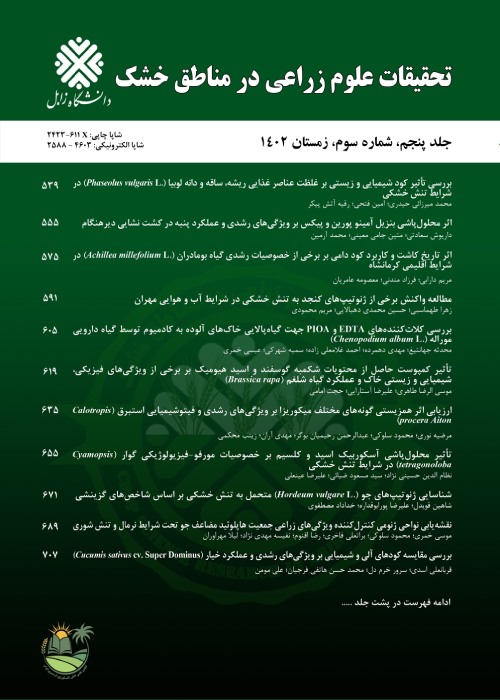Effect of biochar and salicylic acid on physiological traits and yield of echinacea (Echinacea purpurea L.) under non-stress and drought stress conditions
Author(s):
Article Type:
Research/Original Article (دارای رتبه معتبر)
Abstract:
Introduction
Echinacea (Echinacea purpurea L.) is a herbaceous, perennial plant in the sunflower family; its essential oil and extract are widely used in the pharmaceutical, food, health, and cosmetic industries; and it has antimicrobial, anti-oxidant, and radical -neutralizing properties. Anti-allergy, anti-tumor, and anti-inflammatory properties have been ascribed to them. In arid and semiarid regions, a lack of water and inefficient irrigation techniques are the primary factors limiting the development of the agricultural sector. Drought is one of the most influential stresses on crop performance, and it is well known that it affects a number of physiological processes in plants. This investigation sought to determine the impact of biochar and salicylic acid on the physiological traits and yield of echinacea (Echinacea purpurea L.) under non-stress and drought -stress conditions. Materials and Methods
In order to examine the effect of biochar (in three levels without biochar as control, 20 t×ha-1 and 40 t×ha-1) and salicylic acid (in three levels of zero, 0.5 mM and 1 mM) in two humid environments (no stress and drought stress), a factorial experiment in split plot experiment was carried out in Ilam province (two locations) in a randomized complete block design with three replicates in 2020. The evaluated traits included chlorophyll a, chlorophyll b, carotenoids, soluble carbohydrates, total protein, proline activity, and biological yield.Results and Discussion
The results indicate that the highest increase in biological yield was 45.97% and 45.42%, respectively, in the treatment combination of 40 tons of biochar and no salicylic acid foliar spray and the treatment combination of 20 t ha-1 of biochar and 0.5% salicylic acid foliar spray in the condition of 75% drought stress. Proline content decreased in all treatment compounds; except in the combination of non-drought stress treatment and use of 40 t ha-1 of biochar and 0.5% salicylic acid which increased by 25.71%. The highest increase in carotenoids (36.66%) was obtained if 40 t ha-1 of biochar were used and salicylic acid was not sprayed under 50% drought stress. Also, the results show that by using 20 t ha-1 of biochar and spraying 1% salicylic acid under 50% drought stress, the amount of carotenoids increased by 33.33% compared to the control.Conclusion
As one of the growth regulators, salicylic acid was used to increase plant tolerance to stresses such as drought. In addition, biochar had a positive impact on the enhancement of several physiological characteristics and echinacea yield. Echinacea purpurea L. appears to benefit from the use of biochar and salicylic acid to mitigate the negative effects of drought stress.Keywords:
Language:
Persian
Published:
Journal of Crop Science Research in Arid Regions, Volume:4 Issue: 1, 2022
Pages:
229 to 243
magiran.com/p2497455
دانلود و مطالعه متن این مقاله با یکی از روشهای زیر امکان پذیر است:
اشتراک شخصی
با عضویت و پرداخت آنلاین حق اشتراک یکساله به مبلغ 1,390,000ريال میتوانید 70 عنوان مطلب دانلود کنید!
اشتراک سازمانی
به کتابخانه دانشگاه یا محل کار خود پیشنهاد کنید تا اشتراک سازمانی این پایگاه را برای دسترسی نامحدود همه کاربران به متن مطالب تهیه نمایند!
توجه!
- حق عضویت دریافتی صرف حمایت از نشریات عضو و نگهداری، تکمیل و توسعه مگیران میشود.
- پرداخت حق اشتراک و دانلود مقالات اجازه بازنشر آن در سایر رسانههای چاپی و دیجیتال را به کاربر نمیدهد.
In order to view content subscription is required
Personal subscription
Subscribe magiran.com for 70 € euros via PayPal and download 70 articles during a year.
Organization subscription
Please contact us to subscribe your university or library for unlimited access!


